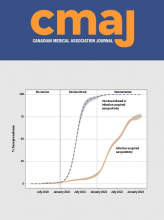Mr. Agarwal (our father and husband) has mild dementia. One day, he suddenly became very quiet, had difficulty putting his thoughts into sentences and couldn’t put one foot in front of the other. We both thought he was having a stroke.
He was seen very quickly in the emergency department and a stroke was ruled out. An infection was eventually diagnosed, but he continued to be confused, weak and unable to care for himself.
When all the tests to investigate the cause of his deterioration were done, and nothing was identified as being “wrong,” it was difficult to understand what was happening. We thought he was going to die — he was 80 years old and everything seemed to be shutting down.
We don’t remember the word delirium being mentioned for the first couple of weeks that he was in hospital. We phoned a friend who was a doctor, and he was the first person we can recall using the word. He said that some people get better and go back to baseline, some never get better and some get back to a different baseline. That helped to set our expectations. He also said that it takes time, and the doctors were probably as frustrated as we were.
The nursing staff were really caring, but they didn’t know what his pre-existing abilities were. We had to repeatedly communicate that this was someone who could go to the washroom on his own and could speak. We think a lot of them assumed that, because he had a diagnosis of dementia on his file, the way he was behaving in hospital was his baseline. We can’t remember how many times we answered the question, “Is this his baseline?” with, “Absolutely not!” We think it is important for medical professionals dealing with patients with delirium to not assume that the person in front of them isn’t able to be more functional.
The best support for a person with delirium is similar to supporting an infant who is learning new things in life. Let them do as much as they physically can on their own and push their boundaries every day. Consider the act of going to the washroom. If standing up isn’t a realistic goal, then a diaper is appropriate. But as soon as possible, the patient should be encouraged to take steps to be independent again. Unfortunately, it’s challenging in our current health care environment, which is a bit focused on safety and liability. Health care providers don’t want people falling or choking when eating. Fair enough, but if patients are to get back to baseline, they have to be pushed a bit.
After he had been in hospital for about a week, a doctor introduced herself to us and said she’d seen Mr. Agarwal in the emergency department. She said she was following up to see how he was doing. We thought that was excellent continuity of care. We were new to Toronto and she referred us to a geriatrician who saw us while still in hospital. That was wonderful.
Before going home, Mr. Agarwal was transferred to a rehabiliation facility. One of us was out of the country and the other had COVID-19, so there were 10 days where we didn’t visit him. When we did, he was playing Scrabble! He told us, “A lady comes to play Scrabble with me every day.” We thought it was amazing that they took the time to understand the things that he would enjoy. The rehabilitation facility was great — they took a real team approach involving occupational therapists, physiotherapists, speech and language specialists, and doctors. — Interviewees wished to be anonymous
Footnotes
Consent has been given for these perspectives to be shared.
This article has not been peer reviewed.
This is an Open Access article distributed in accordance with the terms of the Creative Commons Attribution (CC BY-NC-ND 4.0) licence, which permits use, distribution and reproduction in any medium, provided that the original publication is properly cited, the use is noncommercial (i.e., research or educational use), and no modifications or adaptations are made. See: https://creativecommons.org/licenses/by-nc-nd/4.0/











